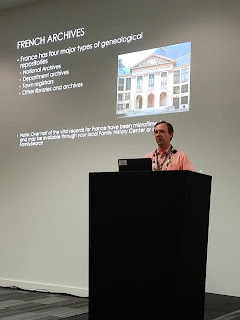Day one of RootsTech London was great. The RootsTech teams did a great job of organizing the event and everything went very smoothly. I presented my talk on exploring European archives online. It was well attended and I had a lot of people come up after the talk to ask questions.
So, what else did I do on the first day of RootsTech London? I attended great presentations, visited the Expo Hall and met up with old friends. I attended two classes on DNA, one by Angie Bush and the other by Diahan Southard. Angie Bush talked about some of the tools that can be used to assist your research using DNA. She talked about how you can triangulate common ancestors, use DNA Painter, and had an overview of the tools Ancestry has available. Diahan Southard discussed the various DNA tests and compared each company's products. She also talked about the differences in Y-DNA, Mt-DNA and Autosomal DNA and how they can be used to improve your research.
 I also attended a class titled The Power of Big Data - Let's Build a Time Machine. This talk described how a consortium of organizations and universities are using data from historic records to create the world of the past. They are working on AI and other technologies to automatically assess records for specific information. More information on this project can be found on their website at https://www.timemachine.eu. The panel of presenters discussed several of the projects that they are currently working on. One project traced the political leaders of Venice by building their family trees and determining how heredity influenced the potential for being elected to offices in the Venice government. Another project they discussed was a population study for a community in southern Spain. This project can be found at http://dag.cvc.uab.es/xarxes. There were several other projects including a 4-D urban history explorer. This program searches for online pictures which it then situates in perspective with the landscape. This allows you to "walk" through a model of the town, looking at the images to see the details of the buildings. This project can be found at http://www.urbanhistory4d.org. There are many other projects being developed within the Time Machine consortium. Take a look and explore the future of historic big data.
I also attended a class titled The Power of Big Data - Let's Build a Time Machine. This talk described how a consortium of organizations and universities are using data from historic records to create the world of the past. They are working on AI and other technologies to automatically assess records for specific information. More information on this project can be found on their website at https://www.timemachine.eu. The panel of presenters discussed several of the projects that they are currently working on. One project traced the political leaders of Venice by building their family trees and determining how heredity influenced the potential for being elected to offices in the Venice government. Another project they discussed was a population study for a community in southern Spain. This project can be found at http://dag.cvc.uab.es/xarxes. There were several other projects including a 4-D urban history explorer. This program searches for online pictures which it then situates in perspective with the landscape. This allows you to "walk" through a model of the town, looking at the images to see the details of the buildings. This project can be found at http://www.urbanhistory4d.org. There are many other projects being developed within the Time Machine consortium. Take a look and explore the future of historic big data.
The last class that I attended was one sponsored by the British Museum talking about their digitization projects. They are working with a variety of partners to digitize historical records and make the accessible to the public. They currently have a web archive storing over 500 terabytes of information. Their collections can be found at https://www.bl.uk. The British Library Labs (https://www.bl.uk/projects/british-library-labs) is working on a variety of projects including optical character recognition for their Qatar Digital Library and Bengal Collections. Both of these projects use manuscripts with foreign script which has been more difficult to transcribe using computer learning but they are making great strides in making these documents accessible to all. Another project they are working on is an assessment of how the Industrial Age impacted people's lives in Britain. This project is looking for volunteers to help them prepare the documents (https://www.zooniverse.org/projects/bldigital/living-with-machines). Another project that they are looking for volunteers to help with is the transcription of historic playbills. This project can be found at https://www.libcrowds.com/collection/playbills.
There are so many new initiatives working to make the historical data available to us today. I can't wait until these projects are complete and we can explore the world of our ancestors in a more immersive way.

1 comment:
Thanks, Miles - enjoyed the update! Glad you are having a chance to combine vacation with RootsTech. The Time Machine initiatives look very interesting - I will check them out.
Post a Comment